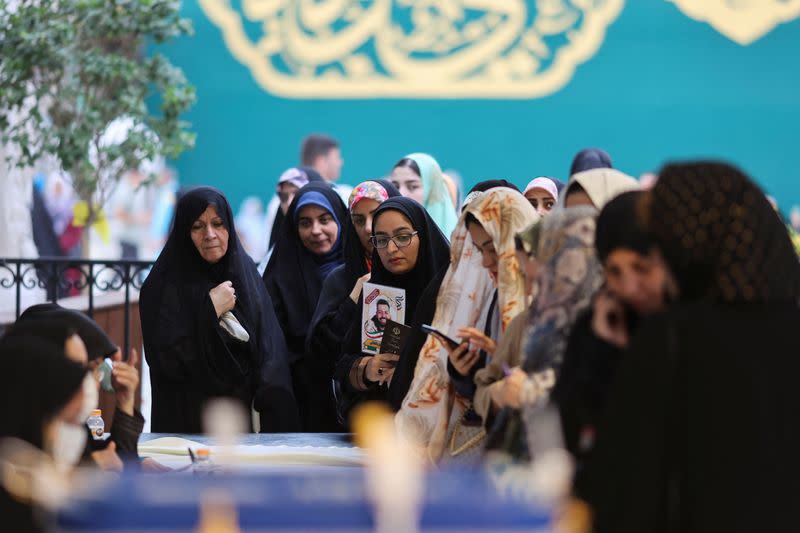Khamenei protege, sole moderate neck and neck in Iran presidential race

By Parisa Hafezi
DUBAI (Reuters) -A low-key moderate and a protege of Iran's supreme leader are neck-and-neck in the vote count in snap presidential elections marked by voter apathy over economic hardships and social restrictions.
More than 14 million votes have been counted so far from Friday's vote, of which the sole moderate candidate Massoud Pezeshkian had won over 5.9 million votes and his hardline challenger former nuclear negotiator Saeed Jalili over 5.5 million, provisional results by the interior ministry showed.
Some insiders said the turnout was around 40%, lower than expected by Iran's clerical rulers, while witnesses told Reuters that polling stations in Tehran and some other cities were not crowded.
Iran's Tasnim news agency said a run-off election was "very likely" to pick the next president following the death of Ebrahim Raisi in a helicopter crash last month.
If no candidate wins at least 50% plus one vote from all ballots cast, including blank votes, a run-off between the top two candidates is held on the first Friday after the result is declared.
The election coincides with escalating regional tension due to the war between Israel and Iranian allies Hamas in Gaza and Hezbollah in Lebanon, as well as increased Western pressure on Iran over its fast-advancing nuclear programme.
While the election is unlikely to bring a major shift in the Islamic Republic's policies, its outcome could influence the succession to Ayatollah Ali Khamenei, Iran's 85-year-old supreme leader, in power since 1989.
The clerical establishment sought a high turnout to offset a legitimacy crisis fuelled by public discontent over economic hardship and curbs on political and social freedom.
The next president is not expected to usher in any major policy shift on Iran's nuclear programme or support for militia groups across the Middle East, since Khamenei calls all the shots on top state matters.
However, the president runs the government day-to-day and can influence the tone of Iran's foreign and domestic policy.
Pezeshkian's views offer a contrast to those of Jalili, advocating detente with the West, economic reform, social liberalisation and political pluralism.
A staunch anti-Westerner, Jalili's win would signal the possibility of an even more antagonistic turn in the Islamic Republic's foreign and domestic policy, analysts said.
LIMITED CHOICES
The election was a contest among a tightly controlled group of three hardline candidates and one low-profile moderate loyal to the supreme leader. A hardline watchdog body approved only six from an initial pool of 80 and two hardline candidates subsequently dropped out.
"Based on unconfirmed reports, the election is very likely heading to a second round ... Jalili and Pezeshkian will compete in a run-off election," Tasnim reported.
Critics of the clerical establishment say that low turnouts in recent years show the system's legitimacy has eroded. Turnout was 48% in the 2021 presidential election and a record low of 41% of people voted in a parliamentary election in March.
All candidates have vowed to revive the flagging economy, beset by mismanagement, state corruption and sanctions re-imposed since 2018, after the U.S. ditched Tehran's nuclear pact.
"I think Jalili is the only candidate who raised the issue of justice, fighting corruption and giving value to the poor. ... Most importantly, he does not link Iran's foreign policy to the nuclear deal," said Farzan, a 45-year-old artist in the city of Karaj.
DIVIDED VOTERS
Pezeshkian, faithful to Iran's theocratic rule, is backed by the reformist faction that has largely been sidelined in Iran in recent years.
"We will respect the hijab law, but there should never be any intrusive or inhumane behaviour toward women," Pezeshkian said after casting his vote.
He was referring to the death of Mahsa Amini, a young Kurdish woman, in 2022 while in morality police custody for allegedly violating the mandatory Islamic dress code.
The unrest sparked by Amini's death spiralled into the biggest show of opposition to Iran's clerical rulers in years.
Pezeshkian attempted to revive the enthusiasm of reform-minded voters who have largely stayed away from the polls for the last four years as a mostly youthful population chafes at political and social curbs. He could also benefit from his rivals' failure to consolidate the hardline vote.
In the past few weeks, Iranians have made wide use of the hashtag #ElectionCircus on X, with some activists at home and abroad calling for a boycott, saying a high turnout would only serve to legitimise the Islamic Republic.
(Additional reporting by Elwely ElwellyWriting by Parisa Hafezi; Editing by Peter Graff, Clarence Fernandez, Alex Richardson, Kevin Liffey, Leslie Adler, Diane Craft and Himani Sarkar)


